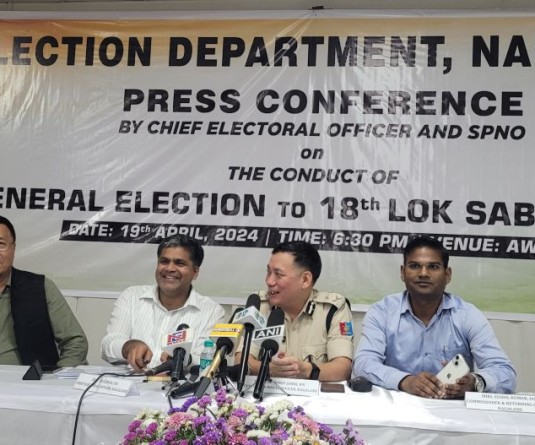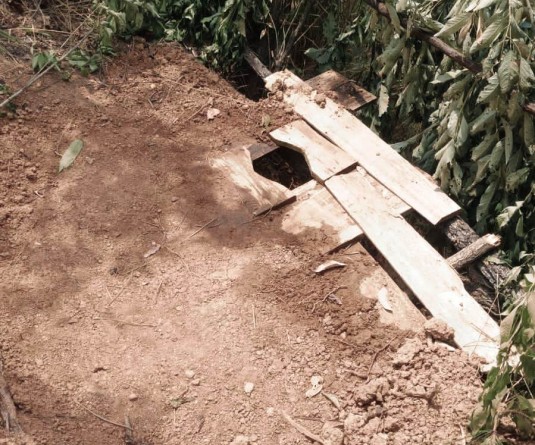
Morung Express News
Dimapur | September 30
Scholars and faculty members from different colleges and universities in Nagaland took active participation at the one-day state level seminar on ‘Nagas in transition: from myth to modernity’ organized by Eastern Christian College (ECC) on September 30.
The seminar in the form of a conversation on “Our (Naga) identity, our struggle for justice and our future” was envisaged with the belief that all stakeholders have “the same vision, the same aspiration, the same prayer, and we all share the same purpose, the same pledge, the same inspiration: to ascertain for ourselves (Nagas) the rightful and dignified place in the discourse of human history.”
Abstracts of speeches at the plenary sessions of the seminar: ‘Impact of dominant culture upon traditional Naga society: a social, political and economic perspectives’ - D Athikho, HoD, Dept of Political Science, ECC
Our Naga society was once characterized by its communality, sense of justice, equality, integrity and honesty. But with the advent of westerners with their hegemonic culture and religion brought many changes in the indigenous Naga practices. Today, a great number of Nagas are neither truly Nagas nor are absorbed in the dominant culture, so they remain as mimic men losing their identity and culture. Our classless and casteless society is now enveloped by materialistic class system where the gulf between the rich and poor is beyond the bridgeable capacity.
‘The social system prior to arrival of Britishers’ - P Alice Donna, Asst Prof, HoD Dept of Sociology, C-Edge College
The Nagas were known for their dignity of labour, respect for elders, honesty, self-reliance etc. Morung was a unique traditional institution practiced among the Naga people. It (Morung) could not sustain its existence because of the forces of modernization and western culture. It was a centre of socialization and a source of spreading and promoting indigenous knowledge systems. It was an inclusive social system of education and institution of change. Nagas followed animism before the advent of the missionaries.
‘The great political movement’ - Kaka D Iralu, Naga writer and author
Unlike other giants and mighty kingdoms in Asia, we Nagas were simple villager republics with five hundred to two thousand houses in each village. Yet our sense of honour and love for our lands stand rivaling many other nations of Asia. With this sense of honour and love for our lands, we have defended our territories with our blood and tears for three centuries in modern history. In modern history, we have been defending our honour and our lands from 1832-1947 when the British entered our lands. On the departure of the British from Asia in 1947, we have been defending our lands again from the India and Burmese invasions from 1947 to the present. Indeed ours is a land begotten and purchased with our blood.
‘Current status of Nagas in administrative fields’ - Sinyhunlo Keppen, Asst Prof, HoD, Dept of Political Science, Emmanuel College
The Village Development Board (VDB) is a statutory body functioning under primary village authority known as the village council. The VDB is an innovative institution in Nagaland and acts as a mechanism for decentralization of planning and development at the grassroots level at its best. Over the past decades, Nagaland has seen increasing transference of political and economic powers to local government.
‘The social benefit of women education’ – Eneingulou Lasuh, Asst Prof, Dept of English, ECC
Education plays an important requirement to catch up with the fast paced competitive world. Female education particularly plays vital role in the process of development in various ways. It improves knowledge about health and hygiene of the family members. It also contributes to children education and earning additional income etc. There has been evidence that higher education yields higher returns of income to households. Education opens up better opportunities and better avenues for exploring new ideas and openings.
‘Failure of modern education to realize the reality of the modern Naga: the need to revive and reinstate the Morung’ – Lhuty Keyho, Asst Prof, Dept of English, Baptist College Kohima
The present scheme of education is rendered incapable of preparing the modern Naga to face the realities of life and the need for an alternative mode of education system, which will equip the modern Naga with a practical understanding of reality and the skill to tackle it, is greatly felt. The Morung, an educational institution in the past Naga societies, instilled in the Naga youth, not only the more important aspects of education- imparting value systems and belief systems, but with skills as well.
‘Cultural values of Ao Nagas’ – Adila Imchen, Asst Prof, Dept of Education, ECC
Nagaland is a paradise state for social science as it is most fertile field to study anthropology and sociology for its colourful traditions. Folklores, myths and legends as well as customs of the Naga tribes, which carry the traces of their ancient chronicles. The Naga culture includes headhunting, feast or merit, log drum, food and drinks, dress and ornaments, festivals, rituals and ceremonies, customary laws, herbal medicines and Morung system etc.
‘An overview of myths, beliefs and traditions of the Ao Nagas in literature’- Dr. Sentinaro Tsuren, Asst Prof Dept of English, Baptist College Kohima
Although the Nagas as a whole exhibit many similarities yet there are many individual characteristics that differentiate the culture of one tribe from the other. Naga have a rich oral literature which includes numerous myths, legends, beliefs, customs, values etc, which were handed to posterity by word of mouth. Temsula Ao’s collection of poems based on folklore and myths is rich in its presentations of these aspects of the study.
‘Reading a terrible matriarchy in the context of Angami Naga inheritance law’ –Inakali Assumi, MA English, ICFAI University
One of the main reasons for the unequal treatment of women in the Angami Naga society was because of the law of inheritance where the inheritance was passed on to a male and not to a female offspring. Easterine Kire has portrayed the way in which women are treated unequally because of the traditional beliefs and customary law in her book ‘A terrible matriarchy’.
‘Current status of Naga in administrative fields’- Aloli H Kinny, Asst Prof, HoD, Dept of Political Science, C-Edge College
The council of ministers along with the chief played a vital role in the administration of the Naga sovereign villages. The decisions taken on any matter becomes the law and are obligatory in the villages. The chief of each village undertook the administrative works mostly on civil and criminal disputes.
‘Insurgency, terror and trauma in Temsula Ao’s ‘These Hills called Home: stories from a war zone’” – Ratan Chandra Das, Asst Prof Dept of English ECC
Temsula Ao, a prominent poetess and writer from Nagaland internalizes the prevailing conditions of her hilly home state and depicts the disorder lies in the lives and society of her motherland. Nagas are targeted and trapped by both colonial and post-colonial masters. Even in the post colonial era, Nagas are subjugated and treated as the ‘other’ by the Government of India and super-imposed their ‘Nation-State’ ideology upon the Nagas.
‘A study of social issue in Temsula Ao’s lyrics’ - Sentimenla Jamir, MA ICFAI University
Like most fiction from post-colonial indigenous cultures, ‘These hills called home: stories from a war zone’ are stories describing the Naga conflict, portraying how human beings cope in war zones, whether military or political or cultural or a combination of all. Written with raw intensity, by memory and imagination Temsula Ao, a gifted writer, has attempted to publicize the concerns of the Nagas.





